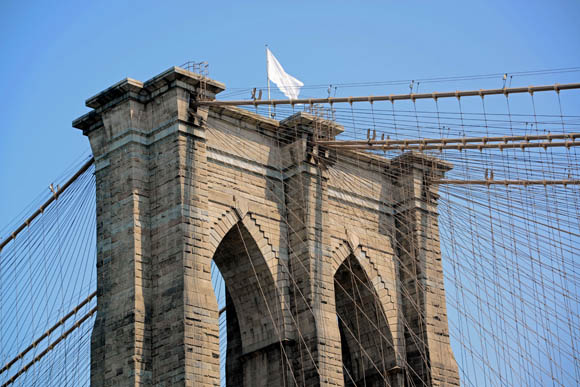Famous bridge opens; infamous Nazi flag is ripped

A flag and a famous bridge were recently linked when two German artists/activists climbed the Brooklyn Bridge to fling two white-washed American flags to the breeze. They later claimed that they were honoring “the beauty of public space” and saluting the German-born architect who designed the span.
In 1937, another famous bridge, on the verge of its grand opening, was connected to an infamous flag – again with a German connection.

The occasion was the debut of the Golden Gate Bridge in San Francisco. All sorts of revelry were planned, including opening the span to pedestrian traffic before cars were allowed on it. The City by the Bay also sponsored a fiesta of nations, with flags from all over the world flying above downtown streets.

The problem was that one of those flags was the swastika banner of Nazi Germany. Even though World War II was two years in the future and four years from involving America, members of the International Longshoremen’s Union were displeased with that flag’s waving over their hometown.
On the day before the bridge opened, they did something about it. As the Associated Press reported in newspapers throughout the nation, the union’s members “bearing a long pole fitted with a cutting device tore the flag from its overhead wire, leaving only a tattered shred fluttering over the street.”
Their action won hoorahs from anti-fascist groups and Jewish organizations, but it miffed the German ambassador in Washington, D.C., already upset by the Hindenburg disaster earlier in May. Mayor Angelo Rossi of San Francisco issued a quick apology. “All nations have been invited to the fiesta,” he explained, “and I think it is very unbecoming…to ask that [the Nazi insignia] be removed.”

An editorial in a Portland, Oregon, newspaper backed the mayor. The Nazi flag, it stated, “represent[s] a great and friendly nation….The incident itself is stupid and provoking.”
In San Francisco, The Chronicle observed that “a few foolish individuals” desecrated the Nazi flag and would be dealt with accordingly. Otherwise, it said, the incident was not a big deal.
The biggest deal would occur in 1941. After Japan attacked Pearl Harbor in December, Germany and Italy declared war on the United States. In response, the Chronicle declared that “the stake now is more than even the life of the Nation. It is the life of free civilization; it is the preservation…of all we have won.”
